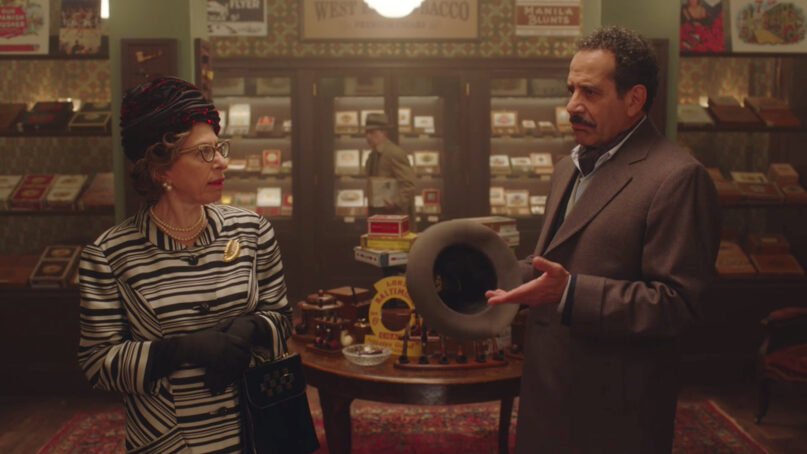(RNS) — This is hardly news to my regular readers, and/or to my friends: I am a total fan of “The Marvelous Mrs. Maisel,” even when it disappoints.
In my opinion, Episode 7, which aired this past Friday evening (March 11), contains one of the best Jewish lines in recent television history.
Rose Weissman’s new matchmaking venture is threatening the business of an “interfaith consortium” of more established matchmakers. The women bring subtle and not-so-subtle pressure against her.
Gitta, the Jewish matchmaker (Jackie Hoffman), accosts Abe Weissman in a tobacco store. She says: “There’s a line in the Torah: ‘F– with me and you die.'”
For all those viewers who went scurrying to their chumashim and/or to Google, I could have spared you the trouble.
No, that line is not in the Torah.
But, perhaps it should be.
We Jews like to muse about the definition of a Jewish holiday. “They hated us, they tried to kill us, we won, let’s eat.”
The holiday of Purim, which starts Wednesday evening, sums up that jaundiced and woefully incomplete view of the Jewish festival cycle.
But, there is more to it than that.
“They hated us, they tried to kill us, we won — because we (or God) fought back — let’s eat.”
On Pesach, God fought back. On Hanukkah, a Jewish army — the Maccabees — fought back. On Purim, Jews fought back against the Persians.
During the Shoah, Jews fought back — in the ghettos and sometimes in the camps. Those acts of resistance were not successful. From the vantage point of Jewish identity, it did not matter. They happened.
“F— with me/us and you die.” That is the essential conceit behind Quentin Tarantino’s counterhistorical film “Inglorious Basterds.”
Imagine: an Italian American director makes a movie that conjures a guerrilla gang of Jewish soldiers, led by the non-Jewish Aldo Raine (Brad Pitt). “We’re going to be doing one thing, and one thing only: killing Nazis.”
Add to that: Shosana Dreyfus (played by Melanie Laurent) — the Jewish cinema owner who witnessed the execution of her family in France when she was 15 years old — and who has decided it is time for revenge. She blows up her own movie theater as the entire Nazi high command are attending a propaganda film.
“F— with me/us and you die.”
A total Jewish revenge fantasy — which projected a different ending to World War II.
Then, there is “Defiance,” starring Daniel Craig, about the heroic Bielski brothers, who saved Jews in Belarus during World War II. Yes, that Daniel Craig. The guy who played James Bond. We are talking about tough Jews here.
Then, there was the poet-warrior Abba Kovner, who toyed with the idea of poisoning 6 million Germans as revenge for the Holocaust. The group was called Nakam, revenge. When that plan became unfeasible, they turned to poisoning loaves of bread that German prisoners of war would consume. Two thousand German prisoners got sick; none died.
There is actually a song about this, “Six Million Germans/Nakam,” recorded by Daniel Kahn and Painted Bird.
In nineteen hundred forty fiveAmong the Jews who were left aliveThere came a visionary manWho turned his wrath into a planAbba Kovner was his nameAs a partisan he earned his fameHe was a Vilna rebel JewA poet warrior through and throughSix million Germans…You might say it was insaneThat it was misdirected painThey didn’t want the war to endThey wanted one thing, Nakam: Revenge
Reform congregations never really get to the very end of Megillat Esther. They never really end the story. They usually finish it off with the hanging of Haman and his 10 sons.
But, wait, there’s more. The story ends with King Ahasuerus permitting the Jews to fight back against their enemies.
That part would probably make us queasy. It isn’t “nice.”
Revenge, vengeance, fighting back: How do we really feel?
A little ambivalent.
On the one hand, we are embarrassed. Consider the prayer that appears toward the end of the Passover Seder, calling down curses upon the enemies of the Jews: “Pour out Your fury on the nations that do not know you … for they have devoured Jacob and destroyed his home.”
Where did this prayer come from? Jews probably uttered it during the Crusades, in the midst of slaughter. It’s not “nice”? Yes, well, when you consider that we were powerless, and that such wishes were projections of our own internalized anger and impotence, you kind of get it. Especially because Jews rarely, if ever, acted on those hostile impulses.
Can you blame us for being angry? Especially when you consider what our parents used to say: “Don’t fight. Be a nice Jewish boy (or girl).”
As Shaul Magid notes in his new biography of the late Rabbi Meir Kahane, founder of the Jewish Defense League, Kahane sneered at such reticence. He was all for militancy, vengeance, Jewish toughness, and the results of his ideology were malignant.
On the other hand, we are proud. We love the stories of the revolts in the ghettos of Warsaw and Vilna. We are certainly beyond proud of the fighting spirit of Volodymyr Zelenskyy.
So, what do we do with these often overwhelming fantasies of revenge?
On the one hand, the Jewish soul contains and even embraces every known emotion: joy, sadness and, yes, even anger. To deny that fullness of emotion is to deny a piece of ourselves. On Purim, I honor the vengeance piece of the Jewish soul.
But, on the other hand, such revenge fantasies constitute the yetzer ha-ra, the base inclination of the Jews. We cannot act on such fantasies. It is neither a good look nor an effective way of interacting with the world as it is.
That being said: Have a joyous Purim!
And, if you ever come across a group of diverse matchmakers, watch out.






